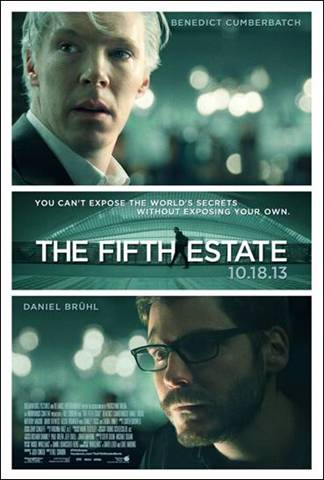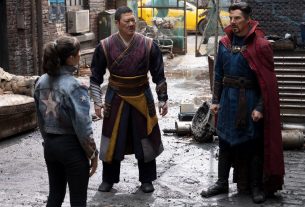Over the public objections of WikiLeaks founder Julian Assange, Dreamworks has produced The Fifth Estate, a film which is as much a critique of the founder as it is an examination of the whistle-blower organization. Benedict Cumberbatch stars as the inscrutable Assange, with Daniel Brühl as Daniel Berg, author of one of the two books upon which the film is based.
 1. What’s it about?
1. What’s it about?
The Fifth Estate relates the history of WikiLeaks, a website that allows users to anonymously upload documents revealing the secret workings of corporations, political organizations and government agencies; the film also profiles Assange and his relationship with volunteers in his organization and interactions with the traditional media. The story is told from the viewpoint of Daniel Berg, a German programmer who becomes a pivotal figure in WikiLeaks. We follow Berg from his first interaction with Assange at a hacker conference, through the growth of WikiLeaks as a media entity, culminating with the massive leak of classified documents relating to the US military’s activities in Afghanistan and the subsequent investigation and legal reprisals, and the personal clashes that follow between the two men.
2. Will my kids like it?
Probably not. This is, after all, a movie about a website, and a political one at that. Most of the plot revolves around news events of the last five years, much of them having to do with government documents. High school students with a passion for politics and social issues will find it fascinating, but it will put younger kids right to sleep.
3. Will I like it?
Probably, given that you’re reading GeekDad. It’s a pretty geeky topic. If you’re interested in current affairs, political corruption, internet culture, and the questions of privacy and personal liberty raised by the events, if you were interested in the WikiLeaks story when it was happening and followed the case of Chelsea (formerly Bradley) Manning, you’ll want to see The Fifth Estate.
4. How accurate is it?
I don’t know. Its portrayal of the actual information leaks and their aftermath match up to my memory of what was reported at the time. I can’t vouch for the accuracy of the portrayal of Assange or any of the other real people represented, but I’m sure that a week from now there will be dozens of websites neatly cataloging each and every incident shown and assessing the degree of truthfulness therein and setting the record straight. One would hope that by now audiences have learned not to expect films “based on a true story” to accurately present any true story as it actually happened; events will be overlooked, altered or compressed and multiple persons combined into one ‘composite’ character, with everything slanted to illustrate the filmmaker’s purpose and biases; certainly The Fifth Estate is no exception. It presents a generally accurate explanation of the publicly-known events; any objections concerning accuracy will likely revolve around the representation of the people involved and their interactions with one another.
5. How do they make a movie about computer files interesting?
As a dramatic film, The Fifth Estate is a solid work, telling a compelling story involving interesting characters. Cumberbatch is excellent in his portrayal of a very difficult personality who describes himself as possibly being on the autistic spectrum and whose personal history is one of pain and trauma. The entire cast turns in solid performances, particularly Brühl, Alicia Vikander as Berg’s girlfriend, Peter Capaldi (the next Doctor Who) as the editor of The Guardian, and Laura Linney and Stanley Tucci as US intelligence agents.
The film is densely packed and a visual info-dump, making extensive use of on-screen text, graphics, archival footage, and illustrative visual metaphors to convey complex information and concepts succinctly. It’s a film that demands the viewer pay attention. Some of the metaphorical scenes (such as illustrating the unverifiable nature of online identities by showing a huge office full of desks, each with a different nameplate, with the same actor sitting at each one, all typing away at their computers) might strike the tech-savvy as simplistic and trite, but for filmgoers who are less-than-comfortable with computers, the imagery helps to explain what’s going on.
6. It’s rated R; why?
According to the MPAA statement, the rating is due to “language and some violence.” The “F-bomb” gets a bit of a workout, and there is a shockingly brutal assassination of two characters, but except for those two things, The Fifth Estate could be shown on network TV. There’s no nudity, and the few romantic interludes are tamer than anything you’ve ever seen on the CW. The violence is presented in documentary fashion, not gratuitously, and it’s more the suddenness of the attack that’s shocking than any gore involved.
7. Does this film have an agenda?
It doesn’t seem to. For as much as Assange declared it all but character assassination, it seems to be a surprisingly even-handed treatment of him and his company. The film presents a solid argument in favor of the WikiLeaks mission while also wrestling with the reality of the repercussions caused by the release of sensitive information. One subplot involves a government functionary in a Middle East country who is a covert source for US intelligence, who finds his life and family in peril as a result of information given to WikiLeaks, putting a human face on one of the ethical issues involved. Many of the objections raised by Assange and others are directly addressed in an interview segment in which Cumberbatch directly quotes Assange’s comments regarding the film and its source material.
8. Will I want to see it again?
Probably on DVD, after reading up on the people and events. I found myself hitting Google as soon as I got home to learn more about some of the story. There is no doubt a lot of information that I missed the first time through, and Benedict Cumberbatch is always interesting to watch, especially when playing a man as complicated as Julian Assange.
9. Will I be surprised by the plot twists?
Not if you’ve been paying attention during the last five years. The Fifth Estate is more about how it happened than what happened, and mostly about the people who made it happen.
10. What is “the Fifth Estate”?
In Medieval days, the “three estates” were the clergy, the nobility and the commoners; these three power-blocs were considered to be the moving forces behind political and social change. Later, following the invention of printing and the expansion of literacy, the press became known as “the fourth estate” for its ability to shape public opinion. In recent years, “the fifth estate” has been used as a label for various aspects of civil society including trade unions, the proletariat, and alternative media such as bloggers; in the context of the film, “the fifth estate” refers to the entire internet community, not just bloggers; the people who quickly disseminate information globally and can hold the other four estates accountable in a way that had never before been possible. As Assange says, “You are the fifth estate.”



